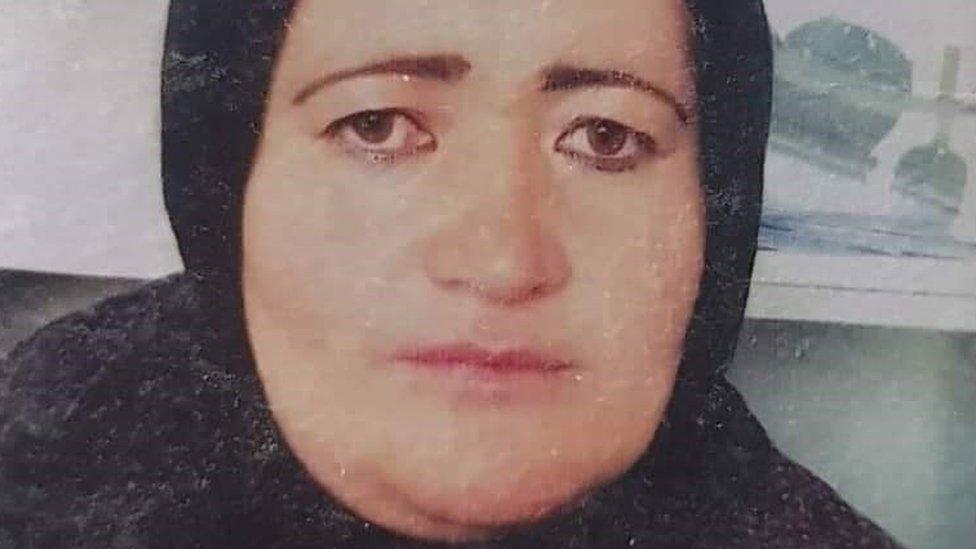Afghanistan: Taliban accused of killing pregnant police officer
- Published

Banu Negar's family say the officer was eight months pregnant when she was killed
Taliban militants in Afghanistan have shot dead a policewoman in a provincial city, witnesses have told the BBC.
The woman, named in local media as Banu Negar, was killed at the family home in front of relatives in Firozkoh, the capital of central Ghor province.
The killing comes amid increasing reports of escalating repression of women in Afghanistan.
The Taliban told the BBC they had no involvement in Negar's death and are investigating the incident.
Spokesman Zabiullah Mujaheed said: "We are aware of the incident and I am confirming that the Taliban have not killed her, our investigation is ongoing."
He added that the Taliban had already announced an amnesty for people who worked for the previous administration, and put Negar's murder down to "personal enmity or something else".
Details of the incident are still sketchy as many in Firozkoh fear retribution if they speak out. But three sources have told the BBC that the Taliban beat and shot Negar dead in front of her husband and children on Saturday.
Relatives supplied graphic images showing blood spattered on a wall in the corner of a room and a body, the face heavily disfigured.
The family say Negar, who worked at the local prison, was eight months pregnant.
Three gunmen arrived at the house on Saturday and searched it before tying members of the family up, relatives say.
The intruders were heard speaking Arabic, a witness said.
There is anger at the Taliban in Kabul, but others in rural areas welcome the end of a deadly war
Since taking power on 15 August, the Taliban have sought to portray themselves as more tolerant than their global reputation suggests, but incidents of brutality and repression are still being reported in parts of Afghanistan.
Human rights groups have been documenting revenge killings, detentions and persecution of religious minorities. The Taliban have said officially that they will not seek retribution against those who worked for the former government.

"No grudges, no revenge," was the Taliban message at their first press conference after they took power. But there's a growing chasm between Taliban statements and the message coming from the streets where every Talib has a gun and controls his own corner.
It's hard to gauge the extent of abuse and harassment, particularly of women, across this country. Horrific incidents may be isolated but there's an everyday tension now enveloping the lives of many women, especially professionals, and those who must work to feed their families.
In Kabul, everyone I've spoken to - former government advisers, airline cabin crew, teachers, hairdressers - are worried. Some are downright scared. Some are hiding in safe houses.
The Taliban continue to stress that "women and girls will have all their rights within Islam". But rules which are emerging, such as the new dress code and classes segregated by gender at universities, underscore how women's lives are set to change, beyond recognition.

The Taliban on Sunday gave more details of how segregation of the sexes will be enacted in universities.
In an extensive document, the new authorities said men and women must be separated, if necessary by a curtain.
Ideally, women will be taught by women but if none are available then "old men" of good character can step in, AFP reports.
Female students must wear an abaya, or robe, and niqab, or face veil.
On Saturday, Taliban officials broke up a demonstration by dozens of women in Kabul demanding the continuation of rights built up since the end of the Taliban's previous spell in power.
The group say the Taliban targeted them with tear gas and pepper spray as they tried to walk from a bridge to the presidential palace.
Meanwhile, fighting is reported to be continuing in the Panjshir Valley, north of Kabul. The province is the only part of Afghanistan actively resisting Taliban rule.
The opposition National Resistance Front of Afghanistan (NRF) said its spokesman Fahim Dashti and a commander, Gen Abdul Wudod Zara, had been killed.
But the group also said a prominent Taliban general and 13 bodyguards had also died in the conflict.
NRF leader, Ahmad Massoud, posted on Facebook that he welcomed a proposal from religious leaders for a negotiated end to the conflict.
He said that the NRF would be prepared to stop fighting if Taliban stopped its attacks.
Earlier, the Taliban said their forces were now in the provincial capital, Bazarak, where they inflicted "numerous casualties", though this was disputed by the NRF.